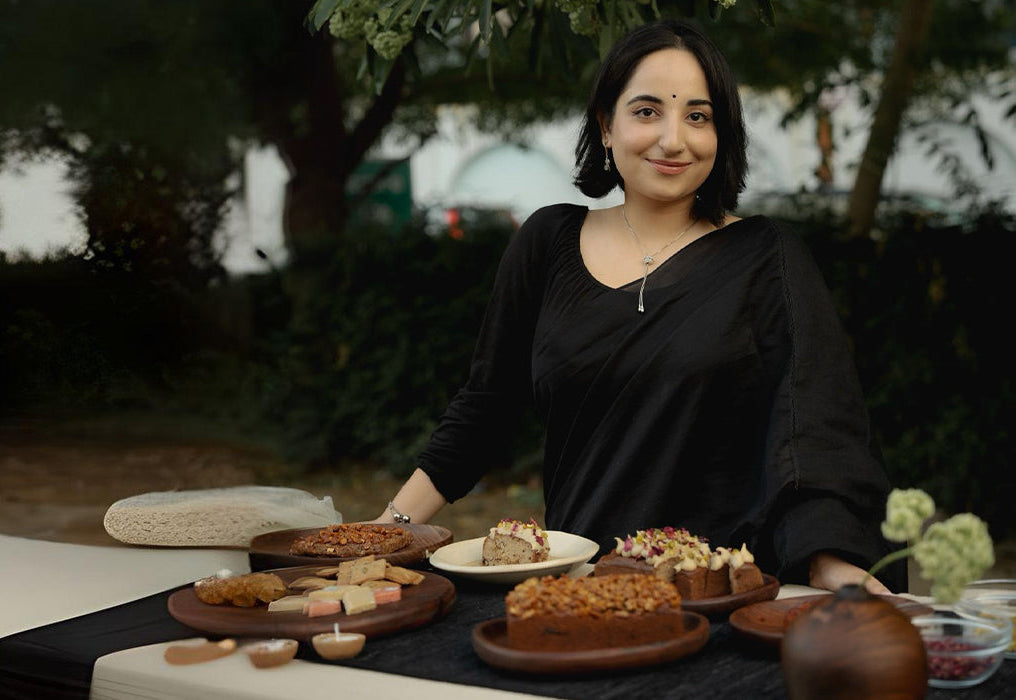The Cinnamon Kitchen: Celeb-Favourite Indian Vegan Bakery Lands Shark Tank Deal at $1.4M Valuation
5 Mins Read
Indian vegan bakery The Cinnamon Kitchen secured a ₹60 lakh ($72,000) investment from Aman Gupta on Shark Tank India. Landing the deal at 5% equity, the brand was valued at ₹12 crores ($1.44M), and is among a handful of other plant-based companies to have appeared on the show.
New Delhi-based bakery The Cinnamon Kitchen has joined a small but growing list of vegan businesses to secure an offer on season three of Shark Tank India, negotiating a successful deal with boAt founder Aman Gupta that puts the brand’s valuation at ₹12 crores ($1.44M).
The ₹60 lakh ($72,000) investment was the four-year-old brand’s first fundraise, and since the airing of the episode last week, it has already put a call out for chefs and pastry interns to work in its 2,500 sq ft factory in nearby Noida.
A vegan business fuelled by a PCOS diagnosis

The Cinnamon Kitchen was born years after founder Priyasha Saluja was diagnosed with PCOS. Following the news, Saluja began experimenting with healthy treats to manage her condition. She ditched dairy, and swapped out refined flour for millets and white sugar for natural sweeteners.
Her hobby turned into a business in 2019, which now offers a comprehensive range of gluten-free, plant-based SKUs like cookies, vegan Cheddar chips, granola, cakes, crackers, fudge and even flours. Its popularity has gained it attention from Bollywood celebrities like Sonam Kapoor Ahuja, Arjun Kapoor and Malaika Arora.
Sharing her experience on LinkedIn, Saluja explained that The Cinnamon Kitchen was part of a cohort of eight to 10 businesses – where she was the youngest and only female founder – that were being supported by the Shark Tank India team with polishing pitches, creating setups and revising financials thoroughly.
She revealed that entrepreneurs on the show enter the tank twice – once for the first shot of entering the tank, and the other when they walk inside to the sharks. The pitch, though, has to be in a single shot. “When it was time for the first shot, the music started playing, all lights were on me, cameras were focused, and as I kept walking towards the tank, it filled me with immense confidence – it was in that moment that I truly felt prepared,” she wrote.
In another post, she said: “I grew up watching Shark Tank US since I was 13-14, and I had never thought that one day I would be there, but I was here. The dissociation was so huge in that moment that I still felt like I was watching it, except that I was not watching it, I was in it.”
Saluja shared that she struggled with the pitch initially, before writing the whole thing in one go. “As I started putting my thoughts on paper, I realised I couldn’t do it for two days because I was trying to be someone else: a serious businesswoman with a very strategic sounding number-led pitch,” she explained. “Through writing the pitch, I realised that the only way to go about it was to be who I truly am and have fun during the process.”
How The Cinnamon Kitchen bagged the Shark Tank India deal
Saluja’s pitch – asking for ₹60 lakh ($72,000) for a 2% stake in the business – was full of rhymes and humour and garnered a few laughs from the Sharks, who were impressed with the flavour of the samples she produced. However, the brand’s packaging and labelling were criticised by Shaadi.com founder Anupam Mittal and Sugar Cosmetics founder Vineeta Singh, who called out the unclear colour use and damaged-looking labels. Mittal indicated that the brand had too many focuses, and that she needed to choose between the bakery and the CPG business.
The Cinnamon Kitchen founder managed to turn it around, though, backed by impressive numbers. Bootstrapping the company with just ₹50,000 ($600), her business grew from strength to strength financially, with sales rising from ₹1.4 lakhs in 2019-20 to ₹82 lakhs in 2022-23. She projected that the business would make ₹6 crores this year, which left the Sharks taken aback, but she explained that the startup had already seen ₹1.3 crores by September (at a 30% profit), and would see a festive season spike for Diwali.
She received an offer from Singh, who matched the ₹60-lakh ask, but with a 10% stake instead of the original 2%. Mittal proceeded to join her with the same offer. But then, Singh swooped in with an individual offer of ₹10 lakhs ($12,000) for 2% equity, plus a further ₹50 lakhs ($60,000) in debt at 12% interest over two years.
But Saluja wanted a deal without debt, and countered with a deal of ₹60 lakhs for 4%. Gupta raised this to 5%, before the entrepreneur was advised by a guest Shark (who had opted out of the deal due to a conflict of interest) to counter to both offers on the table with ₹1.2 crores ($144,000) at a 10% stake. When she did so, Singh withdrew her interest, while Gupta expressed that he wouldn’t be interested in investing so much.
Saluja eventually said yes to Gupta’s 5% deal, which valued The Cinnamon Kitchen at ₹12 crores ($1.4M). Despite the back and forth, she managed to seal an offer that would help propel the vegan bakery business forward, and joined a very exclusive list of plant-based businesses to have gained a Shark Tank deal in India. This includes jackfruit meat maker Wakao Foods and footwear company Ethik (protein powder brand Green Protein and hemp business India Hemp and Co. were also offered deals, but turned them down).
Brands like The Cinnamon Kitchen play to what Indians want from plant-based foods, a market valued at $42M in 2022. In 2021, a Kerry study found that health was the top motivating factor for Indians switching to vegan food. This is especially true for plant-based dairy products, according to research by the Good Food Institute, with claims like “no added sugar” or “no preservatives” appreciated by consumers.
With a relatively huge valuation for a plant-based startup in India, The Cinnamon Kitchen will now hope that both the Shark Tank effect and investment will boost its sales in the short- and long-term, respectively.



